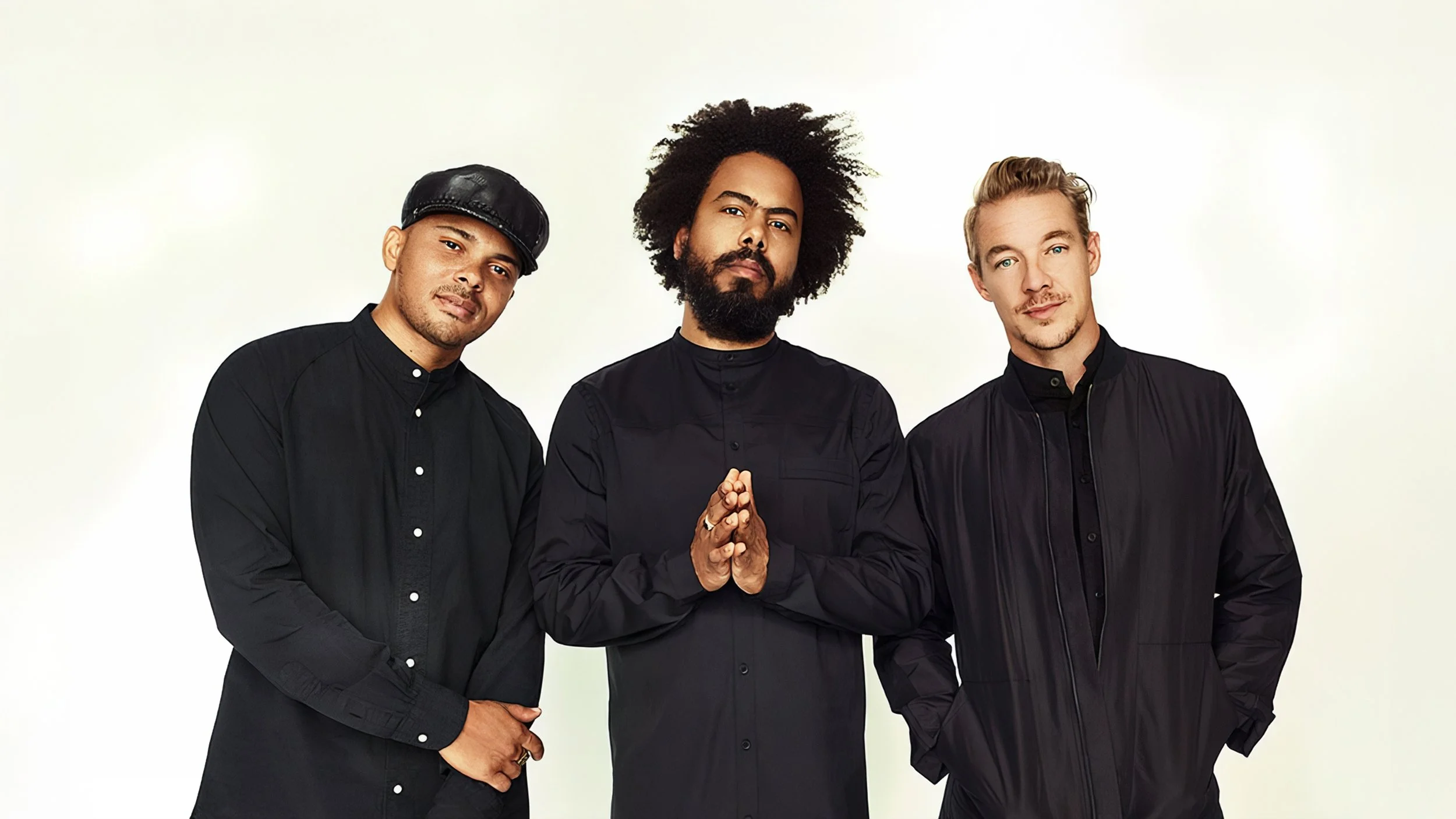
Major Lazer
Name & Pronunciation: Major Lazer (collective project; name pronounced as spelled)
Years Active & Status: 2008 to Present (active)
Origin & Heritage: United States (project founded by Diplo, with Jamaican/dancehall and global influences)
Hook: Major Lazer stands as one of the flagship acts bridging dancehall, reggae, and electronic bass music a mainstream scale - fusing Caribbean rhythms, global voices, and festival energy into a hybrid sound that helped open the door for ReggaeEDM and genre crossovers.
Motto/Tagline: "Making the world smaller by making the party bigger"
BIOGRAPHY
Major Lazer launched in 2008 as a collaborative concept between producers seeking to merge reggae and dancehall tradition with futuristic electronic production. Early on it paired Diplo with producer Switch to invent a persona and sonic identity centered on a "digital reggae" aesthetic. Over time the project expanded to include other producers and collaborators, becoming a fluid collective rather than a fixed band.
From its earliest releases, Major Lazer worked with vocalists across Jamaica, the U.S., and beyond, drawing in dancehall MCs, pop singers, and international artists. Their debut Guns Don't Kill People… Lazers Do signaled an intent to use Caribbean rhythms as the backbone for electronic global pop. As the membership evolved (with Switch departing, Jillionaire and Walshy Fire joining, and later Ape Drums), the collective amplified its scope, increasingly embracing cross-genre collaborations and large-scale festival presence.
Major Lazer broke through globally with tracks like Lean On, Cold Water, and Light It Up, which combined strong pop hooks with dancehall-inflected production. Over time, the group moved between underground dance orientations and mainstream chart success, leveraging its reputation as both party engine and cultural mixer. They also extended into visual narrative, with a Major Lazer animated series and visual branding that echoes their fusion ethos.
Today, Major Lazer remains active as a multi-member production collective and touring act. They continue to release albums, EPs, and singles, and maintain collaborative relationships across genres, continually reinforcing the possibility of reggae-rooted sound in an electronic and global context.
REGGAEEDM ANALYSIS
Reggae Root
Rhythm: Their productions frequently adopt off-beat skanking, dembow and dancehall rhythmic accents, and syncopated percussion - even in fast-paced EDM contexts.
Bass: They lean on deep sub basslines, dubstep-inspired low end, and reggae bass punch as a structural element.
Vocals/Message: Rather than purely political reggae messaging, they often deploy vocals as texture - inviting dancehall, pop, rap, and melodic voices to carry mood, identity, or catchy hooks.
Electronic/EDM Techniques
Genre Blending & Cross-Pollination: Major Lazer often fuses moombahton, trap, dancehall, soca, and EDM elements in one track, bending genre boundaries.
Layered Production & Vox Arrangements: They frequently stack lead vocals, background chants, and rhythmic voices, using vocal texture as part of the groove.
High-Impact Mix & Dynamic Contrast: Their tracks use drop mechanics, filter sweeps, sidechain compression, and tension and release dynamics to shift between dancehall groove and EDM energy.
ESSENTIAL WORKS & WHAT TO LISTEN FOR
"Lean On" (2015): A global smash that melded Caribbean flavors, electronic production, and a hooky vocal performance - often cited as one of the most streamed songs in Spotify history.
Peace Is the Mission (2015): A turning point album that brought together pop, dancehall, and dance music on a large, festival-ready scale.
Music Is the Weapon (2020): Their more recent full-length entry, showing matured production and wide collaborative scope.
Guns Don't Kill People… Lazers Do (2009): The origin album that first laid down their "digital reggae and dancehall" aesthetic.
Major Lazer Essentials (2018): A compilation that reflects their evolution over a decade, collecting hits and deeper cuts.
INFLUENCE ON REGGAEEDM
Innovations: Major Lazer demonstrated that reggae and dancehall-inflected production could compete on mainstream stages, pushing the idea of genre fusion toward mass audiences. They inspired many ReggaeEDM artists to aim for both underground credibility and crossover appeal.
Impact: Their success helped legitimize the space where Jamaican rhythmic influence and electronic bass culture meet. They showed that a dancehall-rooted aesthetic could evolve - and partner with pop, hip hop, tropical, and electronic scenes globally - creating new pathways and cross-pollination for artists bridging reggae and EDM.
RECOMMENDED ALBUMS
Guns Don't Kill People… Lazers Do (2009)
Spotify: https://open.spotify.com/album/6zggNTdZfYK9VZ5eQ6nRxI
Key tracks: "Hold the Line," "Pon de Floor," "Jump Up"
Notes: Their foundational album, establishing the early vision of dancehall and electronic hybrid.Free the Universe (2013)
Spotify: https://open.spotify.com/album/1zQN75tEB1teG8dJGd0b6F
Key tracks: "Watch Out for This (Bumaye)," "Bubble Butt," "Get Free"
Notes: A bridge album expanding their sonic palette and guest roster.Peace Is the Mission (2015)
Spotify: https://open.spotify.com/album/527RNwbiA13hQH4NymIHc0
Key tracks: "Lean On," "Powerful," "Light It Up"
Notes: Their commercial breakout; sonic cohesion between dancehall and pop.Major Lazer Essentials (2018)
Spotify: https://open.spotify.com/album/4kkcRKWv80jt4e0BJFJ2r4
Key tracks: "Lean On," "Cold Water," "Run Up"
Notes: A retrospective that spotlights their key hits across years.Music Is the Weapon (2020)
Spotify: https://open.spotify.com/album/5sfr7pnsTBW9wcQPbxuitJ
Key tracks: "Lay Your Head on Me," "Que Calor," "Oh My Gawd"
Notes: Their most recent studio album, demonstrating refined global fusion.







